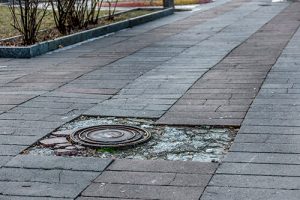First in a Series: Slip and Fall Sidewalk Accidents
Posted September 20th, 2016 by Anthony Carbone, PC.
Categories: Slip and Falls.
 Have you suffered injuries due to a slip and fall accident? Or, did you technically trip and fall? These types of accidents fall under the laws known as premises liability. In this first in a series, we will provide you with some insight concerning the law and sidewalk accidents. We’ll start with residential property owners.
Have you suffered injuries due to a slip and fall accident? Or, did you technically trip and fall? These types of accidents fall under the laws known as premises liability. In this first in a series, we will provide you with some insight concerning the law and sidewalk accidents. We’ll start with residential property owners.
A recent New Jersey unpublished Appellate court decision has a good story to tell regarding a sidewalk accident. While Sunnie Corre was out walking with her family, she slipped and fell. Sunnie suffered a severe shoulder injury. She blamed her accident on the conditions of the walkway. Sunnie’s contention was that the sidewalk was “raised and broken”.
A lawsuit was filed against the residential owners of the property that abutted with the public sidewalk. The lower court dismissed the complaint by way of a summary judgment order. (Essentially, this meant that the defendants had demonstrated there was no need for a trial. The case could be decided on the facts as presented during the hearing requested a summary judgment.)
The plaintiff appealed. However, the Appellate Division agreed with the lower court. Learn why.
The Law and Sidewalk Accidents
To many, it may seem confusing that the complaint against the residential property owners was dismissed. After all, the case was premised on a broken sidewalk. So, why weren’t the defendants deemed responsible? It’s a matter of common law and immunity standards to property owners.
The precedential law regarding sidewalks and residential property owners dates back to Yanko v. Fane, 70 NJ 528 (1976). According to this case, landlords are not liable for conditions of abutting public sidewalks when the accident is due to:
- Actions caused by snow, rain or ice (collectively referred to as the elements)
- Normal wear and tear
To date, claimants have only been able to make claims against residential property owners for “negligent construction or repair of the sidewalk …or for direct use or obstruction of the sidewalk by the owner in such a manner as to render it unsafe for passersby.” The obstruction could be determined to be related to tree roots or other impediments controlled by the residential owner.
We provided you with some basics regarding the Corre case. The plaintiffs attempted to prove that the property owners somehow contributed to the circumstances that caused Sunnie Core to trip and fall. The Appellate Court deemed their argument purely “speculative”. Therefore, it determined that the property owners were entitled to immunity for this sidewalk accident.
Obviously, any slip and fall accident can cause serious injuries. An experienced premises liability attorney will review and investigate the circumstances of the accident to determine liability. In future blogs, we will provide you information concerning sidewalk claims against other types of entities.
Contact Us
If you or a loved one has been injured in any type of slip and fall accident, it is important to secure legal advice. At the Law Offices of Anthony Carbone, we have handled premises liability matters for nearly three decades. Contact us to schedule a free consultation.


